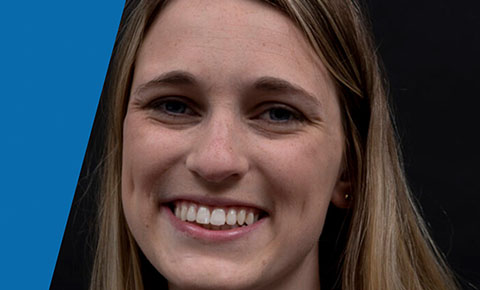Alumna Wins Knowles Fellowship

School of Education and Social Policy alumna Amber Luczak (MS20), a chemistry and physics teacher at Marshall Metro High School in Chicago, has received a five-year fellowship from the Knowles Science Teaching Foundation.
Luczak, who launched her teaching career during the global COVID-19 pandemic, was one of 34 promising high school math and science educators chosen for the Knowles Teaching Fellows Program, a network that supports early-career teachers in their efforts to develop teaching expertise and lead from the classroom.
Though teaching only recently became a vocation, friends and family weren’t surprised by her decision. As a fifth grader, Luczak was volunteering to lead a group of first graders, and she has been working with students in one way or another ever since.
Luczak’s honor marks the fifth consecutive year–and the seventh time in the last eight years–that a School of Education and Social Policy student or alumni has received a Knowles. Previous winners include Bradley Smith (2019), Rohan Prakish (2018), Mason Rocca (2017), Dan Voss (2016), John Holcombe (2014), and Liz Smith (2013).
Luczak, who grew up in Arlington Heights, is especially interested in civic education, social justice education, critical and feminist pedagogy, anti-racist education, and curriculum development around Next Generation Science Standards.
“A teacher’s role is not just to teach their content, but to help students develop agency and self-advocacy,” she says. “This work is not done alone; a teacher’s role also must extend into community membership.”
She earned her Bachelor of Arts in biological science and German at Northwestern’s Weinberg College in 2019. The following year, she received her master’s in education at the School of Education and Social Policy through the accelerated program, which helps students earn their undergraduate, master’s and teaching license in five years.
Her interest in science stems from a natural curiosity about how things work. After taking her first biology class in high school, she began wondering about how she was able to move, what happens when she eats, or why she sometimes feels sick.
"The small-scale mechanisms behind these questions are fascinating, and I quickly latched on to the idea that if we understand how something is supposed to work, we can begin to develop theories about how it might go wrong,” she says.
Luczak worked as a classroom aide at Lincolnwood Elementary School in Evanston, where she facilitated discussions and worked to differentiate math and reading instruction. But when she officially started her career at Marshall, she met her students online.
“The most difficult obstacle is building relationships, especially being brand new to the school,” she says. “I am still learning how to get to know all of my students. Finding ways to connect at the start of class and during small group discussions has been crucial.”
While at Northwestern, she taught high school biology in Hong Kong with a summer school program called Summerbridge and studied multiple sclerosis in an immunology lab at Northwestern University’s Feinberg School of Medicine.
In 2018, Luczak studied abroad and volunteered as an after school tutor in Freiburg, Germany. She worked at a refugee center, tutoring English to more than a dozen students who had recently immigrated to Germany from Syria.
Luczak serves as a leader for Young Life, a youth organization where she has mentored high school students for five years. She also serves as a minister at the Cook County Juvenile Temporary Detention Center through an organization called Precious Blood Ministry.
Through the program, Knowles Fellows have access to grants for expenses associated with purchasing classroom materials, engaging in professional development, and spearheading leadership activities that have an impact beyond their own classrooms.
Fellows also benefit from access to stipends, mentoring and coaching from experienced teachers and teacher educators, and membership in a nationwide community of more than 400 teachers who are committed to improving education.
This year, Knowles has done all programming and relationship building over Zoom, much like her classroom experience. “We are really all learning what it looks like to learn about and care for others who you haven't spent time with in person,” she said. “Some other cohort members and I have taken to sending each other snail mail - it's nice to have some sort of communication that is off-screen.”